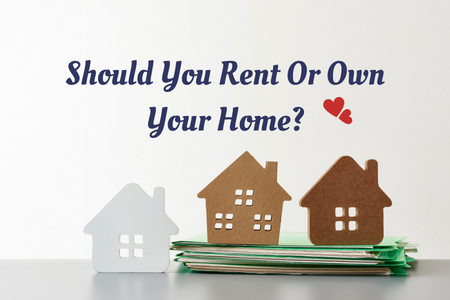Welcome To Our Mortgage Educational Blog About:
Should You Rent Or Own Your Home?

Should you rent or own your home? With more than half the population owning their homes, we can safely say Canadians are big on home ownership.
Whether to buy or rent is a question that everyone has to answer for themselves at one point or another. While buying might seem like the obvious choice, the route to take should be based on several factors unique to an individual.
Here are things to consider when choosing between renting and leaping into home ownership.
1. The 5% Rule
When you buy a home and stop renting, you have no further costs as far as your dwelling lace goes, right? Very wrong!
This common assumption grossly underestimates the costs of owning a home. The 5% rule helps clarify this issue and sheds some light on the renting vs. owning debate.
In essence, the 5% rule states that the annual unrecoverable cost of homeownership is 5% of the property’s value. This is true whether or not you have a mortgage. If the rent you can pay for a comparable home is lower than this, you should keep renting; if it’s higher, consider buying.
Some of the unrecoverable costs of owning a home include:
- Property taxes
- Home Insurance
- Home maintenance costs (excluding renovations as these increase your property’s value)
- The cost of credit (opportunity cost of investing in a home vs other investments, interest on a mortgage)
Metro Mortgage Group can compute first-time homeowner’s mortgages to help prospective homeowners make the best decision.
2. Is Your Life Holding Steady For The Near Future?
Buying a house also means setting and putting down some roots. Only buy a home if you are at this point.
Generally, it takes 5 to 7 years to recoup the purchase costs. Therefore, for buying to make financial sense, you should be able to commit to being in the property for at least seven years; ten years is even better.
Therefore, if your job requires you to move around a lot (for example, military men), renting makes more sense as it provides more flexibility.
3. Your Finances
Only buy a home if you are financially ready to do so. Naturally, your income is a huge determinant of this.
If you don’t have a stable job or regular income, renting might be the best option for the time being as you try and bulk up on a significant down payment.
Even if you are ready now, evaluate how well you can stay afloat months after the purchase. Ideally, your emergency savings should be sufficient to keep you afloat in the first year of your homeownership should things go wrong.
If your finances are too stretched to provide an ample safety net, consider renting for a while longer.
Need Help?
When done right, buying a house is among the best decisions you will make in your adult life.
With over a decade in the mortgage world, our job at Envolve Mortgage Group is to ensure our clients get it right. So if you want to buy a house, don’t dive in blindly: call us today, and let us help you navigate this process and land you the best deal possible.
Don’t go in blind; call me.
Are you ready to purchase your first home? Reach out to me directly or start your application here: www.sandraforscutt.ca/mortgage-application/
Don’t hesitate to contact us with any questions you may have.
